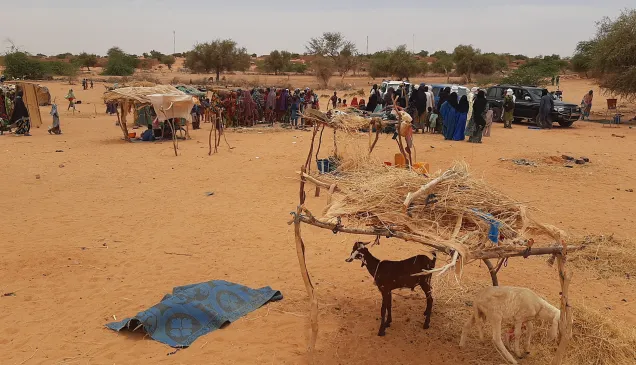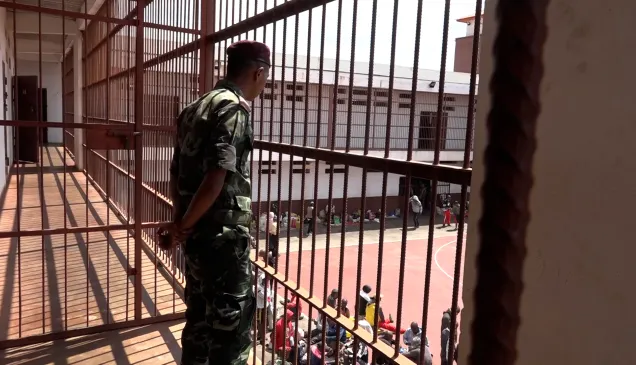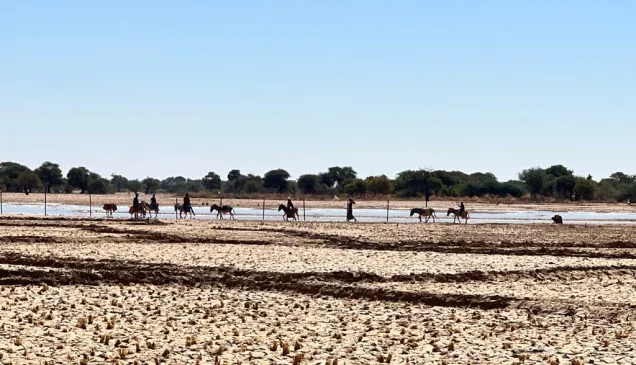Mali: When armed conflict takes a heavy toll on displaced people
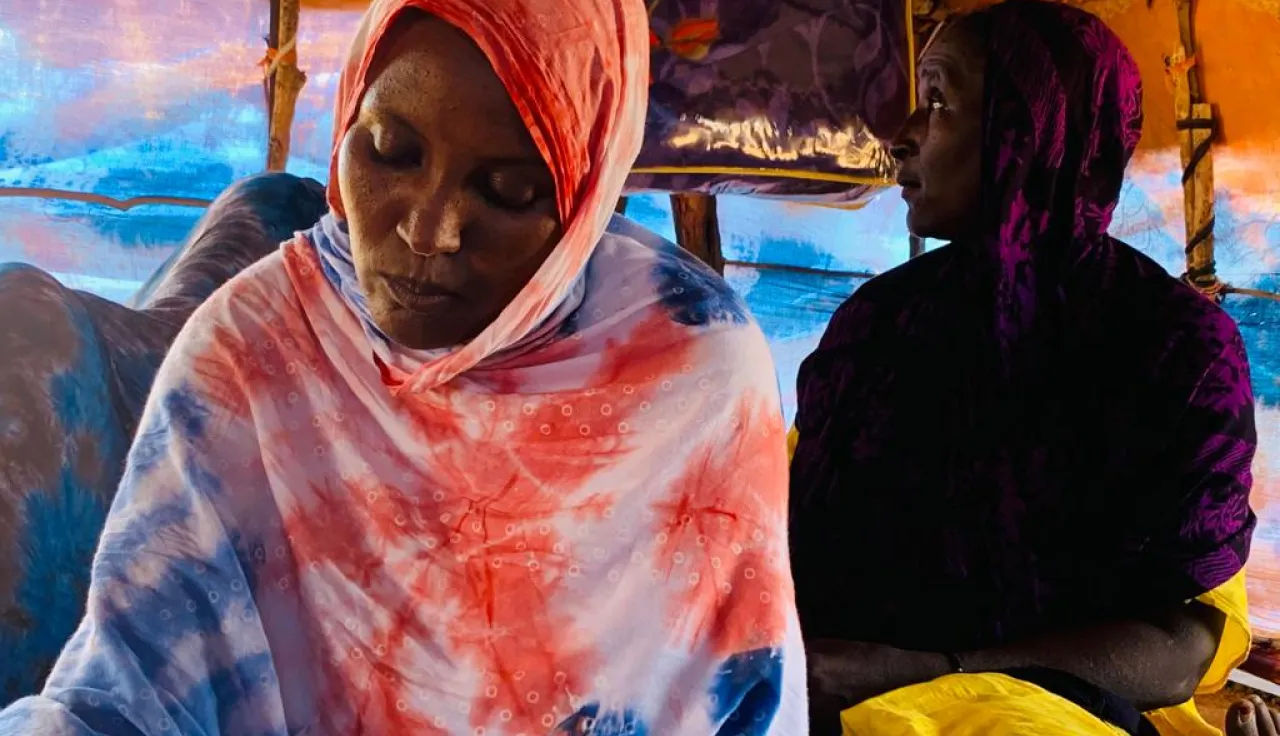
The armed conflict in Mali is brutal for those living there, with families sometimes having just minutes to flee the fighting, their stomachs knotted with fear. Safia,* who is from Gao, was separated from her mother as she fled. Others, like Mohamed, were able to leave with their loved ones. But despite their different stories, they both now have to try and get on with their lives in a makeshift camp.
"I was terrorized when I had to leave my home. We could hear the gunfire for hours. Like everyone else, we were scared of being shot. Nobody dared speak or even cry," says Safia, her voice filled with sadness. Safia is 27 and comes from the Gao region of Mali. She is an only child who lost her father at a young age and lived with her mother. Before that fateful Sunday in February, when armed men ransacked her village, Safia and her mother were inseparable.
Those who survived the attack had to leave their homes and their livelihoods behind. Hundreds of people fled on small lorries. But during the journey, Safia was separated from her mother.
"While we were driving, I realized that the vehicle my mother was travelling in was no longer behind us," says Safia in floods of tears.
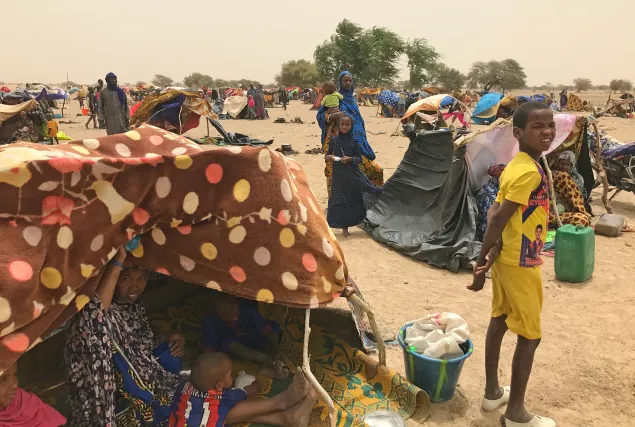
The lack of security has meant that many displaced people have had to leave the place where they thought they would be able to rebuild their lives.
Mohamed is from the same village as Safia. But unlike Safia, he was lucky enough not to become separated from his family when they fled. He is 54 years old and has seven children and three wives. It's the third time he has been displaced since 2012.
"When fighting broke out in my village in 2012, we fled to Burkina Faso. We lived there as refugees for nine years," says Mohamed.
In Burkina Faso, he lived with his family in a refugee camp, surviving on humanitarian aid. But they had to leave the camp after they were repeatedly threatened by armed men. A humanitarian organization helped Mohamed and his family to return to northern Mali. They thought they would find a more peaceful place when they returned. But their struggle still wasn't over.
"We came back to the same panic, the same fear and the same intimidation," says Mohamed.
A roof over their heads
In Bawa, which is five kilometres from the outskirts of the town of Gao, Mohamed, Safia and many other displaced people have at last found a safe place, in one of the many camps for internally displaced people. The surroundings may look similar to their home village, but they know they can't call this place home. They've had to start again from scratch, including trying to find a new way to earn a living. Before she was forced from her home, Safia knitted and did pottery. She made cushions, vases and traditional mats.
"Now, I can't do anything. When I get sick, people club together to look after me. They also give me food. I'm totally dependent on other people, and it's really frustrating," she says.
Mohamed used to raise livestock. "We've always raised livestock. We had cows, sheep and goats. That meant we had food and an income, so we could look after ourselves," he explains.
Thanks to their work, both Safia and Mohamed used to be financially independent. But since arriving in Bawa, they have been dependent on the kindness of the local host community and a humanitarian organization, who provide food and shelter.
"We initially made makeshift shelters out of whatever we had to hand. They didn't even protect us from the sun. Our host community helped us to get tents," says Safia.
But the locals aren't very financially stable either, so they couldn't keep helping. And it's hard for the humanitarian organization too – there are so many other families and displacement camps in need of relief.
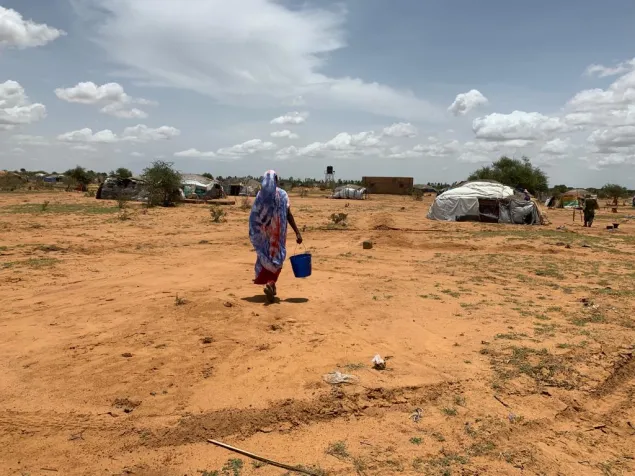
Thanks to the borehole, people don't have to walk as far to get water – Bawa camp in Gao.
Instantly available drinking water
For a long time, people in the Bawa camp – and especially women and children – had to worry about getting water in addition to finding food.
"Here, it's the women who are in charge of bringing the water. The river is about an hour's walk away. We used to go there twice a day. We'd go very early in the morning, then come back and cook. Then after eating, we'd go back a second time," says Safia.
The river water wasn't treated, and people, particularly children, would get sick from drinking it. The International Committee of the Red Cross (ICRC) drilled an emergency borehole to give people access to safe drinking water. That reduced the risk of waterborne diseases and meant that the women and young girls no longer had to walk such long distances to get water.
Now we have time to rest. We can drink as much water as we want, and it doesn't make the children sick anymore, says Safia.
The water pump is solar-powered and provides 40,000 litres of water a day. The ICRC has also set up a committee in charge of making sure the system works properly.
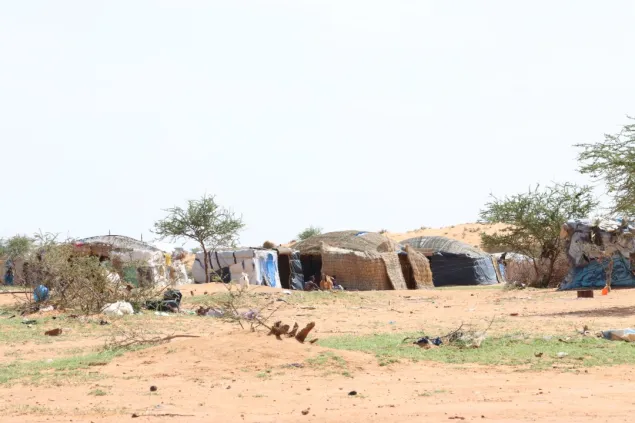
View of the Bawa camp for internally displaced people in Gao
Becoming financially independent to survive
The communities affected by the armed conflict in Mali are remarkably resilient, but they can no longer rely on their traditional means of survival alone. Despite all the efforts, the thousand or so families living in the camp still have difficulty getting access to basic social services. The camp may have a primary school, but the older children have to go to Gao for secondary school and high school.
"We have to get up at 5am to get to school, and we spend the whole day there. We don't get home until a little after 7pm. We walk for about six hours every day," says Rachid, who's 14 years old.
These displaced communities still rely on humanitarian aid. But, now more than ever, they really want to be able to earn a living by opening a small business or taking up market gardening. They need to be financially independent to survive – at some point, the aid will stop (see insert).
There are currently not enough funds to meet people's ever-increasing needs, which compromises the humanitarian relief that can be provided. In the first six months of 2022 alone, the number of internally displaced people increased by 13% as a result of the worsening security situation. More than 400,000 people are now internally displaced in Mali, forced to leave their homes, livestock and livelihoods behind.
We need to make sure we have the financial resources necessary to continue to provide emergency relief to an ever-growing number of people. We also need to find long-term solutions to help communities adapt to rapid change and remain independent.
* Not her real name

